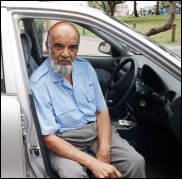Older Drivers Must Watch Life Changes
 EVERYONE gets older with the passage of time. But together with this
realization there must be an acceptance that the changes we experience with
ageing can also affect our ability to drive safely. Older drivers must make
sure that they look out for changes in their eyesight, physical fitness and
reflexes. They also may need to alter their driving habits to stay safe ≠
or to quit driving altogether. EVERYONE gets older with the passage of time. But together with this
realization there must be an acceptance that the changes we experience with
ageing can also affect our ability to drive safely. Older drivers must make
sure that they look out for changes in their eyesight, physical fitness and
reflexes. They also may need to alter their driving habits to stay safe ≠
or to quit driving altogether.
Use the questions below as a guide to check if physical changes have
affected your driving ability. Advice is also provided to cope with these
changes. It could help you to remain a safe driver for many years to come.
Your eyesight: Do you have trouble
- Reading signs easily?
- Recognizing someone you know from across the street?
- Seeing street markings, other cars, and people walking - especially at
dawn, dusk and at night?
- Handling headlight glare at night?
If you said "Yes" to any of these questions, you should:
- Make sure you always wear glasses and that the prescription is up to
date
- Keep your windshield, mirrors and headlights clean
- Make certain that your headlights are working and aimed correctly
- Sit high enough so you can see the road for at least three metres in
front of your vehicle
If you are 60 or older, see an eye doctor every year
Control of your vehicle
Remember that lack or loss of strength, co-ordination and flexibility can
make it hard to control your vehicle
Do you have trouble:
- Looking over your shoulder to change lanes?
- Moving your foot from the petrol to the brake pedal?
- Turning the steering wheel?
- Walking less than a block a day?
- Going up or down stairs because of pain in your knees, legs or ankles?
If you answered "Yes" to any of these questions, you should:
- Check with your doctor about physical therapy, medicine, stretching
exercises, or a walking or fitness programme
- Be aware that an automatic transmission, power steering and brakes,
and other special equipment can make it easier for you to drive a
vehicle and use the foot pedals
- Reduce your driverís side blind spot by moving your mirrors
- Listen for sounds outside your vehicle
Does driving make you nervous, scared or overwhelmed?
- Do you feel confused by traffic signs, people and cars in traffic?
- Take medicine that makes you sleepy?
- Get dizzy, or have seizures or loss of consciousness?
- React slowly to normal driving situations?
If you said "Yes" to any of these questions, you should:
- Ask your doctor if your health or side effects from your medicine can
affect your driving
- Take routes that you know
- Try to drive during the day and avoid rush hour traffic
- Keep a safe distance between you and the car ahead of you
- Remember to always scan the road while driving so that you are ready
for any problems.
Are people close to you concerned about your driving?
Sometimes people notice things about your driving of which you are not
aware. Have people you trust said they were concerned?
If you said "Yes", you should:
- Talk with your doctor. Ask him or her to check the side effects of any
medicines you are taking
- Try walking, joining a carpool or use public transport
Also remember that you if have children in your vehicle, make sure that
they are properly strapped in seats belts of car seats.

Related Topic
Uncovering the myths about the transport needs of the
elderly

 back back
|
 EVERYONE gets older with the passage of time. But together with this
realization there must be an acceptance that the changes we experience with
ageing can also affect our ability to drive safely. Older drivers must make
sure that they look out for changes in their eyesight, physical fitness and
reflexes. They also may need to alter their driving habits to stay safe ≠
or to quit driving altogether.
EVERYONE gets older with the passage of time. But together with this
realization there must be an acceptance that the changes we experience with
ageing can also affect our ability to drive safely. Older drivers must make
sure that they look out for changes in their eyesight, physical fitness and
reflexes. They also may need to alter their driving habits to stay safe ≠
or to quit driving altogether.